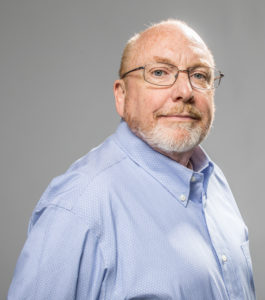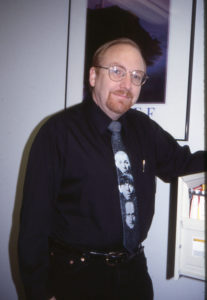Paul Fletcher
Part of the Team
By Linda Norlen

Paul Fletcher is Director of Product Development for the defense and office products manufactured at the Lighthouse.
Paul earned a BA in Sociology from Western Washington University and initially planned to become a police officer. When he began working at the Lighthouse temporarily in 1975, he already had another job that was supposed to begin in a few months. Paul ended up turning down the other job after he had been at the Lighthouse. Rather than being warehoused, the differently abled had opportunities to make things, and that sold Paul on staying. He says those opportunities gave them “spark and excitement.”
Sighted himself, Paul began at the Lighthouse as a trainer in the prevocational training program, teaching work and daily life skills to those who were blind and had other disabilities, a precursor to the supported work program of today. In those years the building consisted of just a single front office and warehouses with worktables between racks. The company made housewares, bows out of ribbon, and preassembled hose fittings.
Paul became a supervisor in prevocational training, then moved to the housewares department, and after that to the hose assembly. He was quality manager for products for ten years and then moved full-time into product development about a decade ago.
Over the years he has supervised every department in the building. Moving around to different positions in the company has allowed him enough variety to keep things interesting and makes it attractive for him to stay for 40 years.
Paul sums up his philosophy of supervision as being all about teamwork and team building. “Be in and amongst the people you are supervising, not above them.” As a manager he tried to identify blind people for leads and supervisory positions. Paul often looked for someone who could replace him in whatever position he held at the time. He would then support that person in their new role while he moved on to another position.

Over time, Paul has changed his management approach and came to understand that management is about listening and observing what’s going on, cueing in on problems, and empowering people to bring their ideas to the table.
Paul says he learned a lot from Mike Hughes, who was one of the first supervisors to learn American Sign Language. The two of them started the DeafBlind program, which initially had three or four members. Now there are about 40 in the program, not all of whom are DeafBlind. Once in production supervision, Paul learned ASL and had participated as a volunteer at the annual DeafBlind summer camps. Paul remembers those camps as the high point of the years he took part in them. When it was time for Paul to move on to a new position, he was impressed by the energy and development of the DeafBlind team as they assumed roles of leadership, some as camp directors.
Robert Johnson, Karen Kidd (Blake Now), and George Jacobson are just a few people at the Lighthouse that Paul has learned from. They gave him challenges that pushed him to become a stronger and more confident. Another inspirational person was Bill Benjamin, “a brilliant mind” who did tooling to make jobs accessible. Paul reflects on how Bill would always find a simple and elegant solution to accessibility issues in the work place.
In his current role as Product Development Director, Paul often meets with U.S. Military engineers to find out what is new and on the horizon. It is important to know which products the Lighthouse needs to phase out, so that “we can be proactive, not reactive,” says Paul.
As an AbilityOne employer, the Lighthouse is one of over 550 nonprofits that provide products to the Federal Government. Government agencies will buy a product if 75% of the labor force is blind and the product is offered for the same price, quality, and delivery time as that of other contractors; the company is then placed on the list of vendors for all government agencies.
Over the years, the Lighthouse has developed many new products, offering a new product line every year. Current products include a canteen, backpack hydration system, folding shovel, stuff sack, and 70 different models of communication boards, such as white boards and bulletin boards.
When the Lighthouse opened its first satellite location in Spokane, Paul and his colleague Pat O’Hara alternated weekly as managers for a year. The Spokane factory manufactures the communication boards, which are co-branded with Quartet® ACCO Brands. Other co-branded products are the hardened hydration system for the military, in collaboration with CamelBak, and a stuff sack, with Cascade Designs.
Paul has seen numerous changes in the technology used in production. Such as, the acquisition of injection molding machines. Paul worked to bring in the first one in the late 1980s; now there are eleven in use. Another innovation is the radio frequency welding that is used for fabricating the hydration bladders. But the bigger changes are “the increased complexity and variety of the work we do here,” says Paul. The Lighthouse has also expanded support services and now offers ongoing computer classes, braille classes, and classes specifically to teach manufacturing skills.
“It’s been a pleasure to work here. I’ve been blessed with having a career that, most days, makes me really like to come to work. If I ever have a bad day, all I have to do is give a tour” of the company to visitors, he says. Observing the pride and satisfaction his blind colleagues feel at being able to do high quality work is enough to lift his mood.